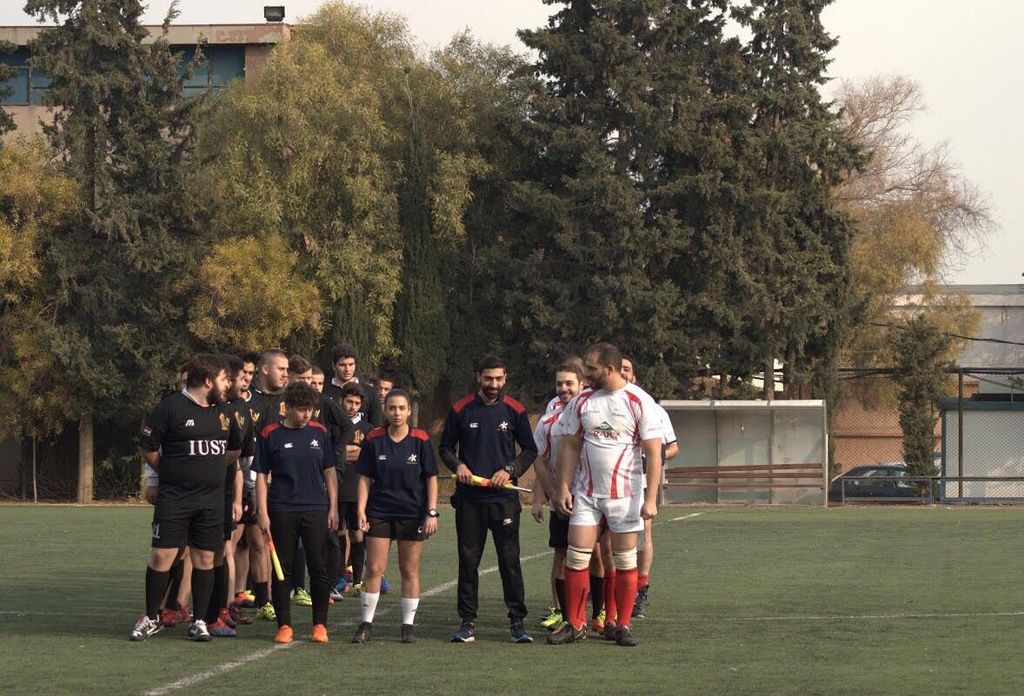History was made in Syria last weekend as Sarah Abdul Baki became the first female referee to officiate a domestic 15s match.
Baki took up rugby three years ago and has, by her own admission, fallen in love with the game.
In 2018, she was part of the Syria women’s sevens side that made its international debut in a tournament in Lebanon and it was also there, last year, that she took her first steps towards becoming a referee.
Baki participated in World Rugby Training and Education courses on coaching as well as strength and conditioning in Beirut, but it was the match officials programme that piqued her interest.
“The course itself made me want to know more, like want to go into more detail about rugby and about laws and rules, etc,” she told World Rugby.
“I loved the course so much and I wanted to referee a match, and Syria Rugby gave me the chance to do that.”

Earning respect on the pitch
Her opportunity arrived as Zenobians took on Palmerians in Damascus last weekend and having overcome a bout of pre-match nerves, Baki stepped onto the pitch with whistle in hand.
“It was a bit hard at first,” Baki admitted.
“You know, it was a big challenge for me. It was my first match to officiate, so it was a bit hard and a big challenge for me but I managed to do it.”
Baki need not have worried about how she would fare and having blown the final whistle, players from both teams showed their appreciation.
“At the end of the match everyone came and they thanked me and they congratulated me on my first match. That was respectful and great,” Baki added.
“I had enough courage to do it, and it was a huge step for me towards being in a place where I can influence and get more women into rugby.”
'Not just for men'
Although Baki has enjoyed success since first picking up an oval ball almost three years ago, her journey has not been free of challenges.
The 22-year-old, who was attracted to the game by its values of passion and discipline, first had to overcome gender stereotypes and the perception that rugby was not a game for women.
“It’s becoming more popular each day because more women are getting involved in rugby,” Baki is pleased to report.
“At first it was hard because I experienced many difficulties trying to convince people surrounding me to accept [me playing rugby].
Sarah Abdul Baki made history by being the first Syrian female refree to officate a domestic 15 a side Rugby match in Syria@SyriaRugby #GirlsInRugby #GetIntoRugby #Unstoppable #TRYandSTOPus#AsiaRugby "We can do better but TOGETHER” pic.twitter.com/Wfzw78KlSS
— Asia Rugby (@asiarugby) January 19, 2020
“It’s considered [not] for women, especially in our country. So it was a big challenge for me but eventually I managed to convince other people that women can do it as well. Like, it’s not just for men.”
Baki describes playing for Syria against two Lebanese representative teams and Qatar in 2018 as a “dream” – beating Lebanon ‘Green’ was a “great feeling” – and she has no plans to hang up her boots for a career in refereeing or coaching just yet.
“I don’t think I’ll ever stop playing,” she said.
“Things are not clear for me right now, I’m just going to continue with everything and I’ll see which one is the right one for me.”
Inspiring women to play rugby
One thing that is clear is Baki’s passion for rugby and her desire to promote the game as an outlet for women living in Syria, a country impacted by an ongoing crisis.
To help her in her ambitions the 22-year-old hopes to be accepted onto World Rugby’s Women’s Executive Leadership Scholarship programme.
“I want to influence and lead more women into rugby, and for my future plans I want to be accepted in the women’s leadership programme so I can keep on giving and develop rugby in my country, and maybe in the Middle East and Asia,” Baki said.
“Yes, it’s important for me to continue inspiring people and women to play this game.
“I think that rugby [can help] change communication between people and maybe they will be more confident, especially women.
“And, you know, there have been difficulties that my country has been facing in the past. The major percentage of the population in Syria is women, which is more likely to provide opportunities for the game to grow and develop.”







